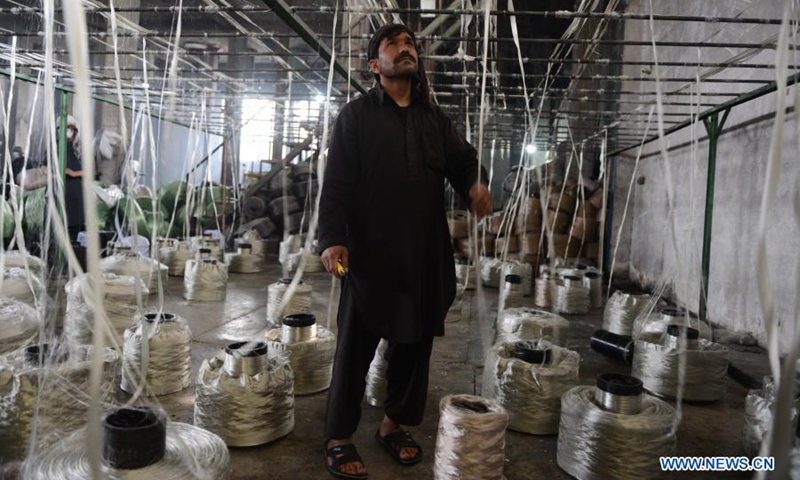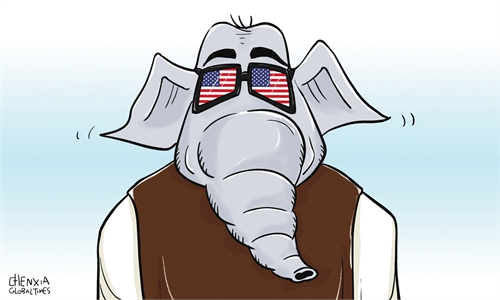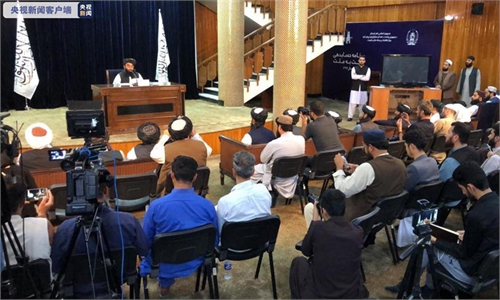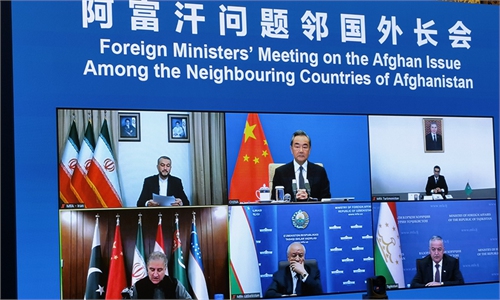Chinese firms plan Afghan platform to examine opportunities and pitfalls of investment
Group eyes Afghan strategy

A man works at a glass wool factory in western Herat province, Afghanistan, Feb. 21, 2021. Photo: Xinhua
Chinese business representatives in Afghanistan are to establish an industry platform for investment promotion after the Taliban announced the formation of an interim government on Tuesday.
While the situation remains unclear, with some major countries not having recognized the Taliban government, Chinese business representatives in Afghanistan are looking into the possibilities of investment in the country's reconstruction.
In response to risk avoidance needs among Chinese business and academic circles there, the business representative group -- the China Town in Kabul -- is working to establish what it calls an "Afghan institute" along with corresponding groups and individuals, the Global Times learned.
"We have made agreements with multiple domestic enterprises, university institutes and other organizations to co-build the platform, in order to serve organizations and enterprises in need," an employee surnamed Gao of a Chinese business group in Kabul told the Global Times on Tuesday.
"Various Chinese enterprises in the sectors of infrastructure construction and mining have contacted us for discussion since the release of the platform plan," said Gao, noting that a rough framework of the platform has been formed, and it may be launched in a week.
Li Xijing, deputy general manager of the China Town, told the Global Times that the group has received many active inquiries with good intentions for joining the platform.
The China Town, which originally drafted the institute plan, will provide comprehensive services for the institute when it is set up, including industry information, personal safety, government connections, and bank exchange, tax and logistics services, in light of the statement Li sent to the Global Times.
After many years of instability and underdevelopment under the US-backed Afghan government, the Taliban government has expressed determination to ensure its political dominance in the country, which experts said would mean giving priority to resolving internal problems, including those that matter to the livelihood of the people.
However, experts noted that there are many lingering uncertainties, including international recognition, potential Western sanctioning measures and regional stability, and the Taliban ought to implement commitments that have been made before there can be large investment.
The US and its Western allies are unlikely to recognize the Taliban government in the short run, and considerable investment in Afghanistan's heavy asset sector won't happen soon, Yan Wei, professor with the Institute of Middle Eastern Studies of Northeast University, told the Global Times on Wednesday.
Yan noted that there are many important indicators for China's large-scale investment in Afghanistan, including the fact that the UN Security Council still imposes sanctions on the Taliban. It's also a case of whether the EU and US impose further sanctions on the Taliban, "because if sanctions are imposed, Chinese companies may also be subject to the consequences."
The first thing to consider is the internal political stability of the new government, Liu Zongyi, secretary-general of the Research Center for China-South Asia Cooperation at the Shanghai Institutes for International Studies, told the Global Times on Wednesday, noting that it is necessary to understand whether the new government is open and inclusive enough to negotiate cooperation terms with Chinese companies.
Besides the political stability of Afghanistan, China must be aware of local terrorism ahead of the establishment of diplomatic relations with the country, Liu said.
While large projects may not take place anytime soon, short-term trade and investment could land on the ground first, driven by demand.
"The short-term export trade of food, medical supplies including epidemic preventative items, daily necessities and industrial products to Afghanistan and the imports of local agricultural products and fruits from Afghanistan may be feasible," said Yan.
During a regular press conference on Wednesday, Chinese Foreign Ministry spokesperson Wang Wenbin said that the formation of the Taliban government put an end to Afghanistan's three weeks of anarchy and is a necessary step for Afghanistan's restoration of domestic order and post-war reconstruction.
It is hoped that Afghanistan can build a broad and inclusive political structure, pursue a moderate and stable domestic and foreign policy, resolutely combat terrorism, and get along with all countries, especially neighboring countries, said Wang.



